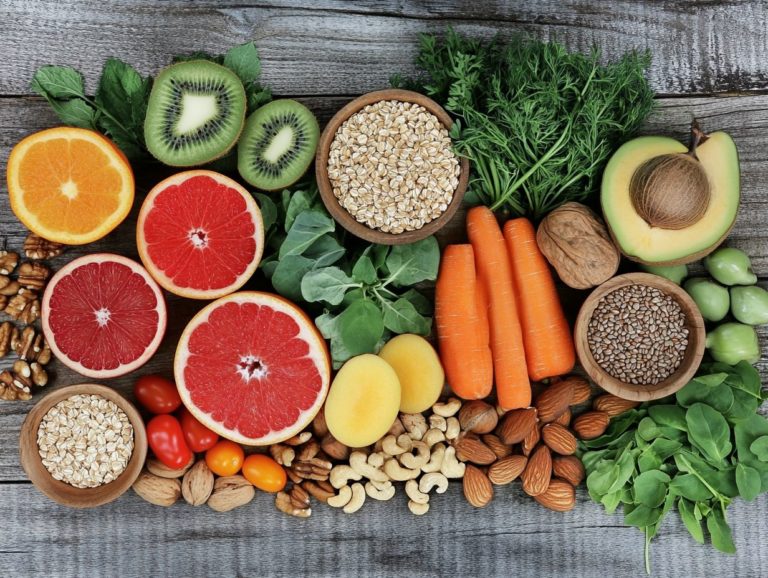Top 10 Nutrient-Dense Foods for Holistic Health
Eating well can feel daunting with the plethora of choices available. Concentrating on nutrient-dense foods can significantly enhance your health.
This article presents 15 powerhouse foods, ranging from dark leafy greens to fatty fish, all designed to nourish your body and promote overall well-being.
You ll discover their myriad benefits, practical tips for incorporating them into your meals, and how they can assist with specific health conditions.
Ready to elevate your nutrition? Let s embark on this journey together!
Contents
- Key Takeaways:
- 1. Dark Leafy Greens
- 2. Berries
- 3. Nuts and Seeds
- 4. Avocados
- 5. Cruciferous Vegetables
- 6. Whole Grains
- 7. Fatty Fish
- 8. Legumes
- 9. Citrus Fruits
- 10. Turmeric
- 11. Garlic
- 12. Fermented Foods
- 13. Eggs
- 14. Lean Protein Sources
- 15. Water
- What Makes These Foods Nutrient-Dense?
- Are There Any Risks or Considerations When Consuming These Foods?
- How Can These Foods Help with Specific Health Conditions?
- Frequently Asked Questions
Key Takeaways:
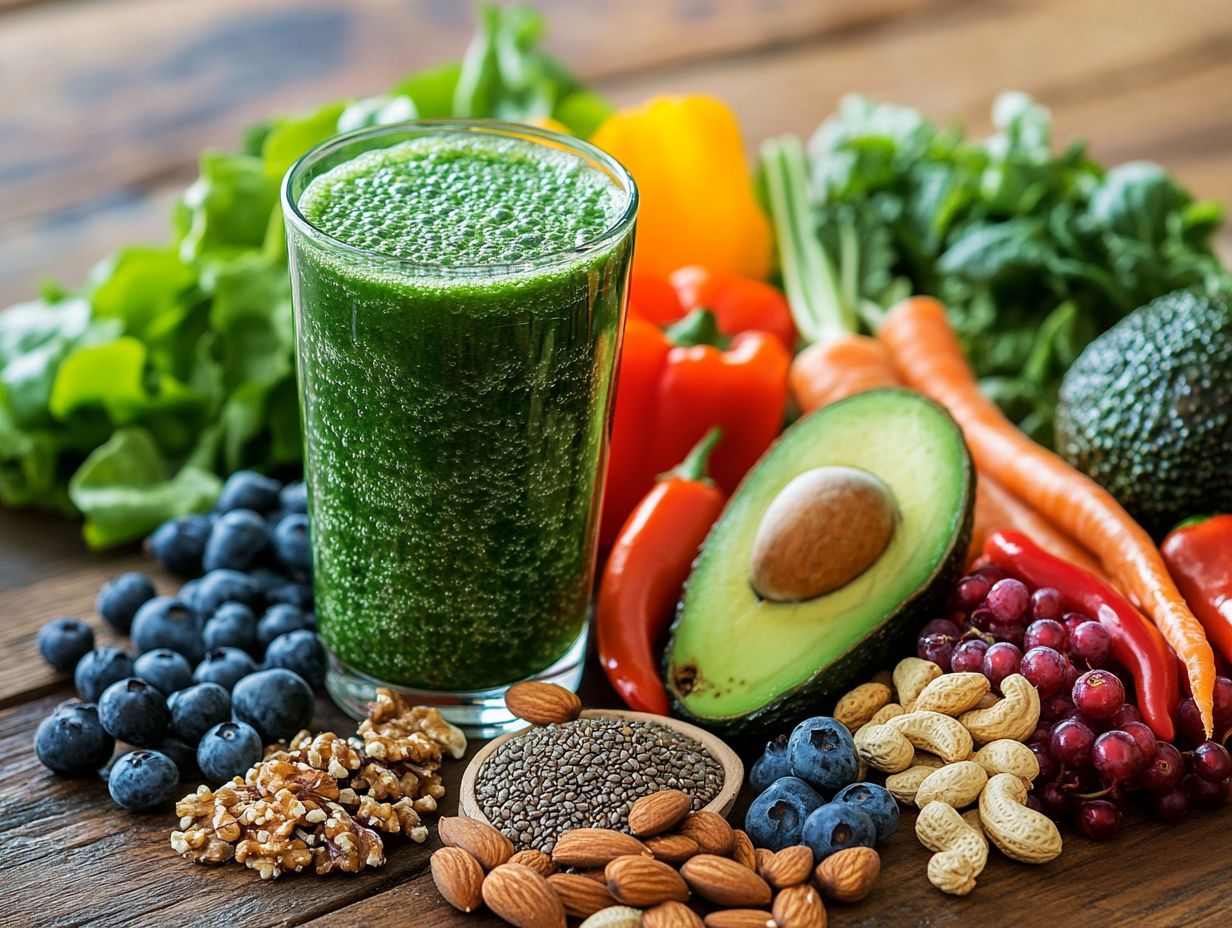
Incorporating nutrient-dense foods like dark leafy greens, berries, and nuts and seeds into your diet provides numerous health benefits. These foods are rich in essential vitamins, minerals, and antioxidants that support overall health and help prevent chronic diseases.
Try adding them to smoothies, salads, or as toppings for meals. Consider any food allergies or potential interactions with medications before consuming.
1. Dark Leafy Greens
Dark leafy greens, such as kale and dandelion greens, are nutrient powerhouses. They are packed with vitamins, minerals, and antioxidants, essential for maintaining health and reducing inflammation.
These greens are low in calories and high in fiber and protein. Together, they support healthy organ function and combat cellular damage from oxidative stress.
They are rich in B vitamins, especially folate, vital for energy metabolism and cell regeneration. Vitamin A helps maintain healthy vision and skin, while vitamin C boosts your immune system and aids in collagen production.
Vitamin K in these vegetables is crucial for blood clotting and bone health. Regularly incorporating dark leafy greens into your meals enhances your nutrient intake and supports your long-term health and vitality.
2. Berries
Berries are small but powerful, brimming with nutrients that pack a serious punch. They are loaded with antioxidants, dietary fiber, and vitamin C making them a remarkable addition to any health-focused diet.
Blueberries shine with high levels of anthocyanins linked to better heart health and improved cognitive function. Strawberries boast rich ellagic acid, celebrated for its cancer-fighting properties.
Blackberries deliver a generous dose of vitamin K and manganese, both essential for bone health and metabolism. Adding these vibrant fruits to your meals can excite your taste buds and boost your health!
3. Nuts and Seeds
Nuts and seeds are exceptional sources of healthy fats, protein, and omega-3 fatty acids, delivering essential nutrients that support heart health and combat inflammation.
Walnuts shine with their impressive levels of alpha-linolenic acid (ALA), a plant-based omega-3 fatty acid known for brain-boosting and anti-inflammatory benefits.
Chia seeds, though small, are mighty powerhouses packed with fiber and antioxidants. They promote digestive health and can absorb water, forming a gel-like consistency that enhances hydration.
Incorporating these nutrient-dense options into your daily meals is effortless. Toss walnuts into a salad or blend chia seeds into your morning smoothie to elevate both flavor and nutrition, promoting overall well-being.
4. Avocados
Discover the incredible benefits of avocados! These creamy delights are packed with healthy fats, fiber, and essential vitamins. They are an ideal choice for anyone looking to enhance their overall health.
Rich in monounsaturated fats, avocados promote heart health by lowering bad cholesterol and boosting good cholesterol levels. The powerful antioxidants in avocados fight inflammation throughout the body, potentially easing symptoms related to inflammatory conditions.
As an excellent source of dietary fiber, avocados support digestive health and help maintain a satisfying sense of fullness. This makes them a superb addition to any health-conscious diet, elevating your meals while nourishing your body.
5. Cruciferous Vegetables
Cruciferous vegetables, such as broccoli and cauliflower, are nutritional powerhouses. They are brimming with substances that fight inflammation, significantly enhancing your overall health.
These vibrant veggies are loaded with essential vitamins C and K, along with folate, all crucial for maintaining a strong immune system and promoting cellular health.
They contain compounds like glucosinolates, which can lower the risk of certain cancers, especially lung and colorectal types.
The high fiber content in cruciferous vegetables supports digestion, fosters a sense of fullness, and helps keep your blood sugar levels in check. Incorporating these vegetables into your balanced diet is essential for your wellness.
6. Whole Grains
Whole grains, such as quinoa and sweet potatoes, are integral to a nutrient-rich diet. They are brimming with fiber, vitamins, and minerals that promote optimal health.
These grains stabilize blood sugar levels, making them particularly advantageous for those striving for consistent energy throughout the day.
By weaving them into your meals, you may experience a reduction in glucose spikes and crashes, ensuring a more reliable energy source.
The impressive fiber content supports digestion, encourages regular bowel movements, and nurtures a healthy gut microbiome. Whole grains are fundamental for anyone looking to enhance their well-being and digestive health.
7. Fatty Fish
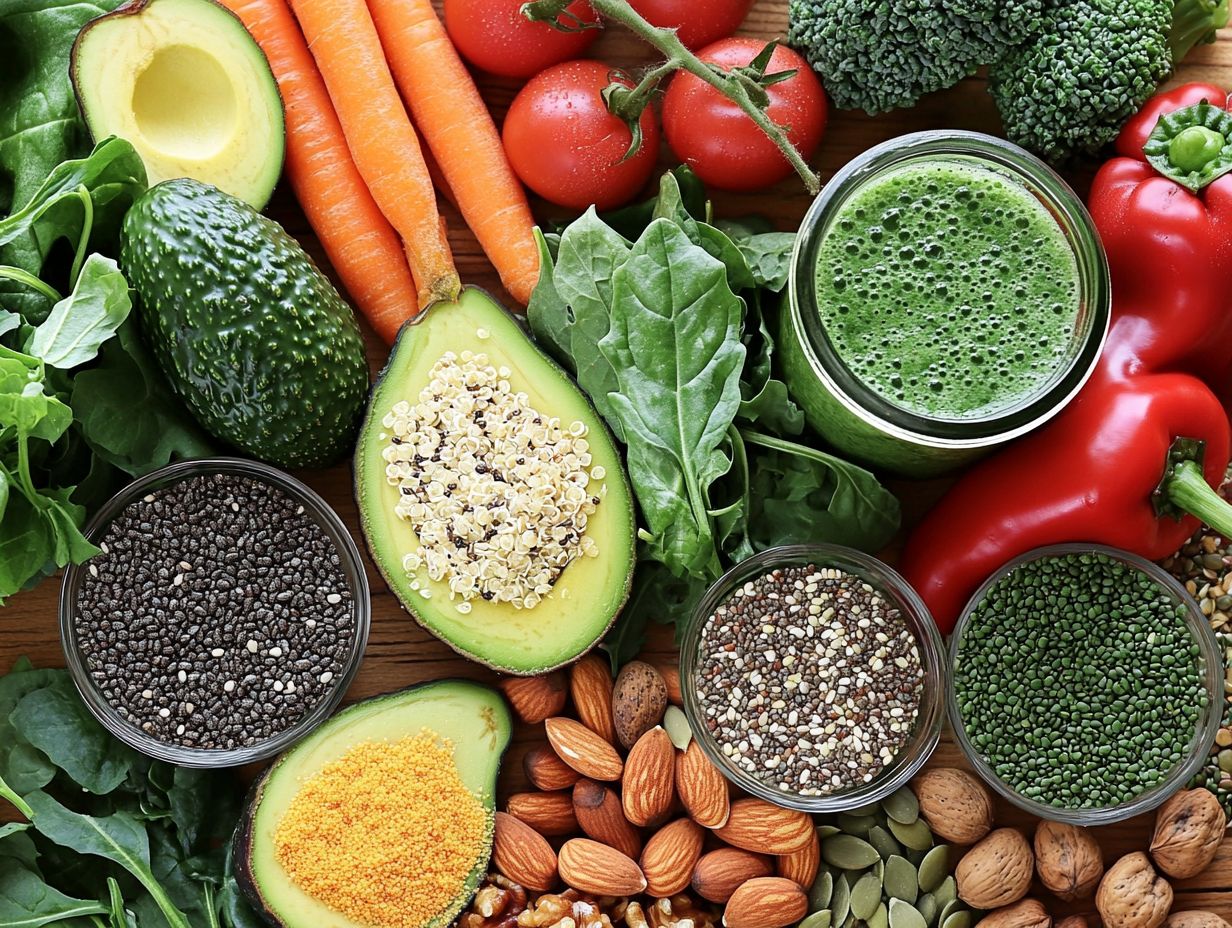
Fatty fish, like wild Atlantic salmon, are exceptional sources of omega-3 fatty acids. These fats play a vital role in promoting cellular health and alleviating inflammation.
Not only are they crucial for heart health by lowering triglyceride levels, but they also impact cognitive performance.
Research shows that consuming fatty fish regularly can boost memory and may even reduce the risk of age-related cognitive decline. Omega-3 fatty acids are linked to a lower occurrence of chronic diseases, including arthritis and certain cancers.
Incorporating these nutrient-rich fish into your balanced diet opens the door to numerous health advantages for both your body and mind.
8. Legumes
Legumes are a powerhouse of protein, fiber, and essential nutrients. They are an exceptional choice for enhancing the nutrient density of your balanced diet.
Consider lentils, which cook quickly and are rich in iron, or chickpeas, easily transformed into vibrant salads or creamy hummus. These plant-based options provide remarkable versatility for your meals.
Beyond their culinary adaptability, legumes help lower the risk of type 2 diabetes due to their low glycemic index a measure of how food affects blood sugar. Their high fiber content promotes digestive health by encouraging regularity and nurturing beneficial gut bacteria.
With all these benefits, incorporating legumes into your meal plan is a savvy, health-conscious choice.
9. Citrus Fruits
Citrus fruits are not just a refreshing treat; they are loaded with vitamin C and antioxidants that provide numerous health benefits. These benefits support your immune system and overall well-being.
These vibrant gems such as oranges, lemons, limes, and grapefruits are rich in compounds that fight oxidative stress, promoting optimal cell health.
Incorporating these fruity powerhouses into your daily meals is a delightful journey! You can squeeze fresh lemon juice over salads for a zesty kick, blend oranges into smoothies for a creamy citrus explosion, or savor grapefruit slices as a revitalizing breakfast option.
The versatility of these fruits doesn t stop there. You can whip up flavorful marinades for meats or add zest to your baked goods. This makes it easy to enjoy their myriad health benefits while indulging your taste buds.
10. Turmeric
Turmeric is a remarkable spice known for its impressive anti-inflammatory properties. Its active ingredient, curcumin, delivers a host of health benefits.
This vibrant yellow spice has been celebrated for centuries, not just for its culinary allure but also for its extensive medicinal applications. Turmeric can help reduce inflammation in the body, potentially easing conditions like arthritis and chronic pain.
Additionally, turmeric may support heart health. Some studies indicate that curcumin can lower cholesterol levels and enhance blood circulation, reducing the risk of heart disease.
Try incorporating turmeric into your daily routine! It s a delightful way to boost your overall well-being.
11. Garlic
Garlic is not just a delicious addition to your dishes; it s a powerhouse of nutrition. It s brimming with vitamins and anti-inflammatory properties that can elevate your health.
Garlic is loaded with essential vitamins such as B6 and C, along with a variety of antioxidants. These help promote heart health by lowering blood pressure and cholesterol levels.
Its unique compound, allicin, gives garlic its irresistible aroma. It also strengthens your immune system, making it a formidable ally during flu season and beyond.
Try adding garlic to your meals today for a boost in flavor and health! By incorporating it regularly, you can enhance your overall well-being and vitality.
12. Fermented Foods
Fermented foods are a treasure trove of probiotics and nutrients that elevate your gut health. These remarkable microorganisms are essential for effective digestion and the absorption of vital vitamins and minerals.
When you include items like yogurt, kimchi, and sauerkraut in your meals, you encourage the growth of beneficial bacteria. This helps alleviate digestive discomfort and reduces bloating.
A healthy gut microbiome is closely linked to improved immunity, enhanced mood, and a decreased risk of chronic conditions. So, by enriching your meals with probiotic-rich foods, you re supporting your digestive health and fortifying your overall well-being!
13. Eggs
Eggs are a true culinary marvel, offering a wealth of nutrients that enhance your overall health. They are packed with high-quality protein, vitamins, and minerals, making them a versatile food option.
Rich in essential amino acids, eggs provide a fantastic alternative to other protein sources, especially for those looking to elevate their dietary intake. They are also brimming with vital vitamins like B12 and D, along with important minerals such as selenium and phosphorus.
Each nutrient plays a crucial role in various bodily functions, from bolstering the immune system to fueling energy metabolism. Healthy fats in eggs help absorb nutrients and support eye health and brain function.
Make eggs a regular feature in your balanced diet for a wise and nutritious choice!
14. Lean Protein Sources
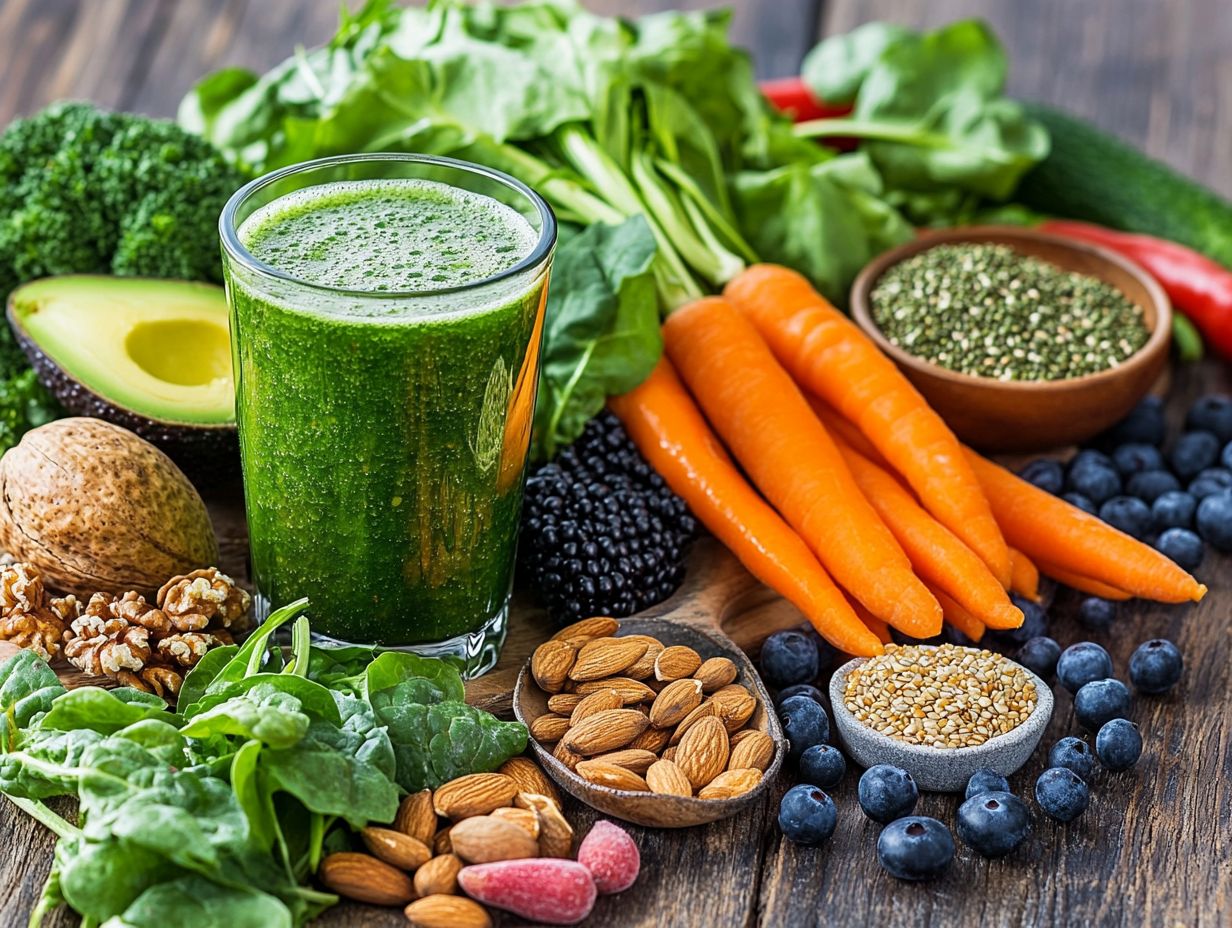
Incorporating lean protein sources into your diet is crucial for meeting your nutritional needs while promoting overall health. These options support muscle maintenance and are essential for a balanced diet.
Options like chicken and turkey offer a wealth of benefits, making them stand-out choices for enhancing your nutrition. Lean proteins are low in saturated fats and help manage your weight by reducing caloric intake while still providing important building blocks for muscle repair and growth.
Packed with important nutrients like B vitamins and minerals, these proteins play key roles in energy production and various bodily functions. If you’re striving for fitness goals or aiming for a healthier lifestyle, adding these lean options to your meals can transform your approach.
15. Water
Water is the most essential nutrient for hydration and optimal bodily functions. It plays a pivotal role in supporting your overall health.
Water lubricates your joints, aids in digesting food, and is crucial for transporting nutrients throughout your body. Proper hydration enhances circulation, allowing blood to flow freely and deliver oxygen and vital vitamins to every cell.
Additionally, it helps regulate your body temperature, enabling you to maintain a stable internal environment, even amidst shifting external conditions. Without adequate water intake, critical functions can falter, leading to health issues from fatigue and headaches to more serious complications.
Make hydration a priority to maintain peak wellness!
What Makes These Foods Nutrient-Dense?
Nutrient-dense foods are your go-to for packing a punch of essential vitamins, minerals, and antioxidants without excess calories. They’re crucial for achieving optimal health and well-being.
You can find these fantastic foods in many categories, including vibrant fruits and vegetables, hearty whole grains, lean proteins, and healthy fats.
For instance, leafy greens, such as spinach and kale, are excellent choices brimming with vitamins A, C, and K, along with powerful phytochemicals that help fight inflammation. Fatty fish like salmon are loaded with omega-3 fatty acids known for their anti-inflammatory properties.
Legumes serve up a powerhouse of protein and fiber that supports digestive health. Whole grains, such as quinoa and brown rice, provide essential B vitamins and minerals that elevate your energy levels and boost metabolic function.
By weaving a variety of these nutrient-dense foods into your daily meals, you can enhance your health and build a strong defense against chronic diseases.
How Can These Foods Benefit Overall Health?
Incorporating nutrient-dense foods into your diet can significantly enhance your overall health. These foods deliver essential nutrients while promoting anti-inflammatory benefits.
Packed with vitamins, minerals, and antioxidants, they lower the risk of chronic diseases such as heart disease, diabetes, and certain types of cancer. Leafy greens and berries are well-known for boosting cardiovascular health and improving blood circulation.
Including healthy fats, like those found in avocados and nuts, can also bolster your immune response. This helps fend off infections and illnesses.
Make these foods a regular part of your meals today for a healthier tomorrow!
What Are Some Ways to Incorporate These Foods into a Balanced Diet?
Incorporating nutrient-dense foods into your balanced diet can be a delightful endeavor. Thoughtful meal planning and innovative cooking techniques can help.
For example, adding leafy greens like kale or spinach into your smoothies amplifies their health benefits and transforms them into a delightful breakfast treat. Tossing quinoa a protein-packed grain into your salads or using it as a base for stir-fries can elevate even the simplest dishes.
Utilizing herbs and spices can turn ordinary ingredients into vibrant meals. This encourages a sense of exploration in your kitchen while prioritizing your wellness.
Are There Any Risks or Considerations When Consuming These Foods?
Nutrient-dense foods offer numerous health benefits. However, be aware of certain risks when adding them to your diet.
If you have food allergies or dietary restrictions, read labels carefully. Certain foods, like nuts, may provoke severe reactions.
Dietary restrictions can arise from factors such as lactose intolerance or gluten sensitivities. This makes it crucial to read food labels meticulously.
Moderation is key, especially when enjoying healthy fats found in avocados and nuts. These can be quite calorie-dense.
Striking a balance in your nutrient intake while avoiding overindulgence promotes a healthier lifestyle and helps mitigate potential health complications.
How Can These Foods Help with Specific Health Conditions?
You ll be amazed at how nutrient-dense foods can manage specific health conditions, like type 2 diabetes and chronic inflammation, by providing targeted nutrients.
For example, incorporating foods rich in omega-3 fatty acids, like fatty fish and walnuts, can significantly reduce inflammation markers in your body.
Studies show that a diet high in fiber from whole grains and legumes can improve blood sugar management, which is vital when dealing with type 2 diabetes.
Individual responses to these foods vary widely. Therefore, collaborating with a healthcare professional to create a personalized nutrition plan is key.
Frequently Asked Questions
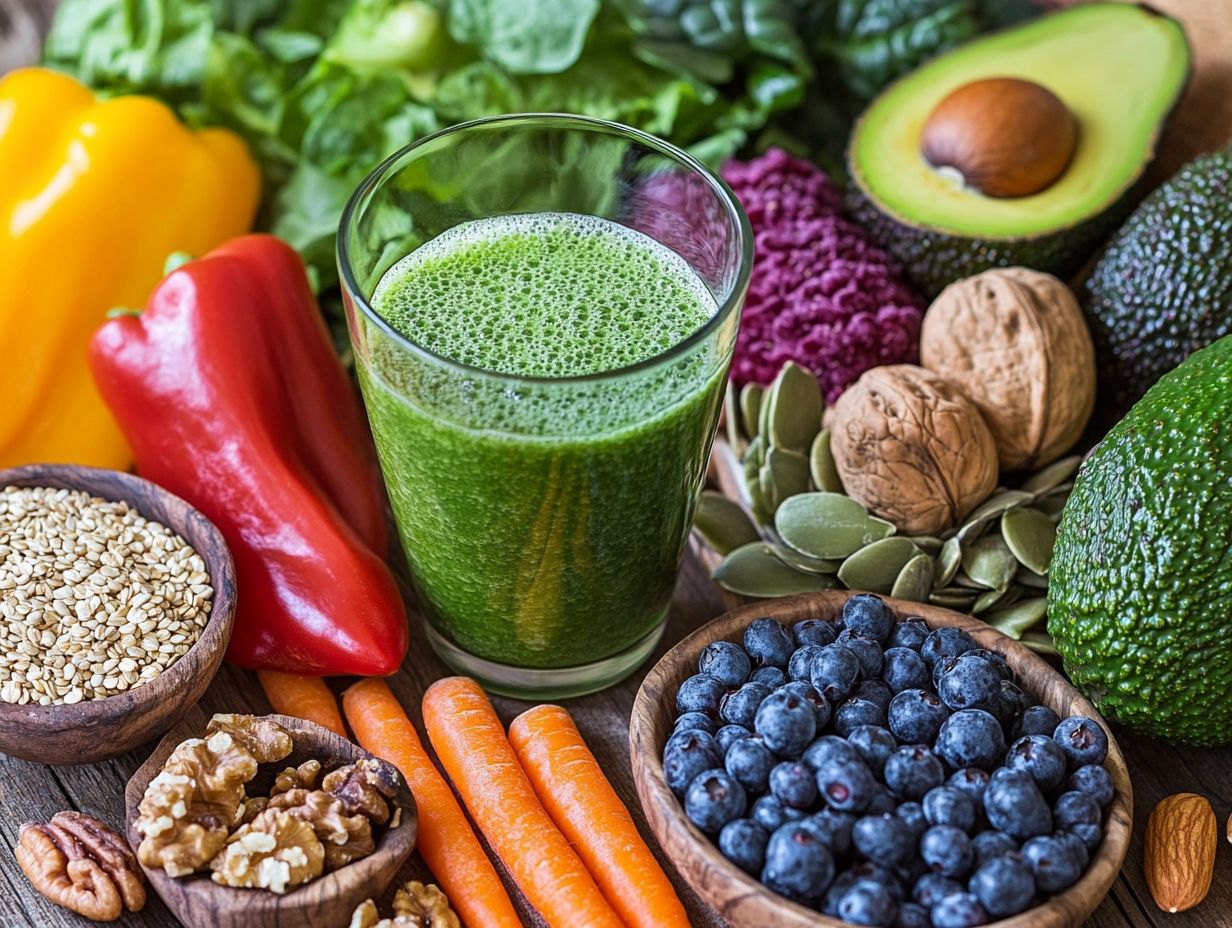
What are the top 10 nutrient-dense foods for holistic health?
The top 10 nutrient-dense foods for holistic health are: leafy green vegetables, berries, salmon, avocado, quinoa, nuts and seeds, sweet potatoes, beans and legumes, eggs, and dark chocolate.
How do leafy green vegetables contribute to holistic health?
Leafy green vegetables are packed with essential vitamins, minerals, and antioxidants. They help boost immunity, improve digestion, and support overall health and well-being.
Can berries really improve holistic health?
Yes, berries are rich in nutrients and antioxidants. They have anti-inflammatory properties, help regulate blood sugar levels, and promote heart health.
Why is salmon considered a nutrient-dense food?
Salmon is an excellent source of protein, omega-3 fatty acids, and essential minerals like potassium and selenium. It supports brain and heart health.
What makes eggs a top nutrient-dense food?
Eggs are a rich source of protein, healthy fats, and essential vitamins and minerals. They are a perfect addition to a healthy and balanced diet for holistic health.
Is dark chocolate really a nutritious food?
Yes, dark chocolate contains high levels of antioxidants, iron, and magnesium. These can help reduce inflammation, improve heart health, and enhance brain function.




